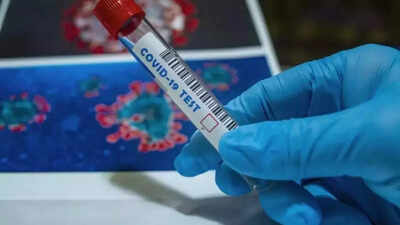Top Searches
- News
- City News
- kolkata News
- Herd immunity, vaccine likely to prevent severe Covid: Doctors
Herd immunity, vaccine likely to prevent severe Covid: Doctors

Representative Image
KOLKATA: Chances of a virulent and severe Covid wave were now remote in India since the variants that have triggered the current spread in China have already swept through our country since 2021 leading to herd immunity against them, felt experts in Kolkata. A spike in the number of cases, however, was imminent since it could be difficult to check transmission from China and other Asian countries which calls for caution and revival of Covid-appropriate behaviour, they said.
The BF.7 strain which is now sweeping through China and apparently causing a severe disease is a sub-variant of Omicron’s BA.5 strain, to which most Indians have immunity, argued CMRI Hospital pulmonology director Raja Dhar. “That apart, China is also struck by the Delta which caused havoc in India and the rest of the world in 2020-21. They had managed to block these strains through a strict imposition of lockdown which prevented herd immunity. So, these strains are now causing a severe disease in China but shouldn’t be too worrying for us since we already have herd immunity to these through community exposure and vaccines,” said Dhar.
While the BF.7 is believed to be a virulent strain with a reproductive value of more than 10, which means one infected person can transmit the virus to 10 others, India have already recorded a few cases two months ago. “But they haven’t spread or caused a very severe disease as yet. It is unlikely that BF.7 will trigger a severe wave for we have already developed a ‘hybrid’ immunity against the Omicron sub-variants due to a mix of community exposure and vaccines. A large section of our population has received three doses which should offer a good protection,” said Peerless Hospital microbiologist Bhaskar Narayan Chowdhury.
Use of masks and social distancing, however, need to be revived ahead of the spike, felt Chowdhury. “We have seen a rise in upper respiratory tract infections since last month, coinciding with the temperature drop. While most of these were likely to be other strains of influenza, cases of BF.7 can’t be ruled out since few patients got tested. We may have detected more cases had the number of tests been higher,” he said.
This points to the fact BF.7, if it strikes India, may cause a mild disease, said Yogiraj Ray, associate professor of infectious diseases at IPGMER. “The community has already been exposed to multiple infections. Herd immunity as well as good vaccine coverage should work in our favour. People who have not taken the vaccine should go for it,” said Ray.
BF.7 will be mild in India if two assumptions turn out to be correct, said Dhar. “First, the mutant would indeed have to be mild to which we have immunity and not a new variant which is unknown to our system. Secondly, our vaccines and natural immunity would have to work against it effectively to prevent a severe disease,” said Dhar.
The BF.7 strain which is now sweeping through China and apparently causing a severe disease is a sub-variant of Omicron’s BA.5 strain, to which most Indians have immunity, argued CMRI Hospital pulmonology director Raja Dhar. “That apart, China is also struck by the Delta which caused havoc in India and the rest of the world in 2020-21. They had managed to block these strains through a strict imposition of lockdown which prevented herd immunity. So, these strains are now causing a severe disease in China but shouldn’t be too worrying for us since we already have herd immunity to these through community exposure and vaccines,” said Dhar.
While the BF.7 is believed to be a virulent strain with a reproductive value of more than 10, which means one infected person can transmit the virus to 10 others, India have already recorded a few cases two months ago. “But they haven’t spread or caused a very severe disease as yet. It is unlikely that BF.7 will trigger a severe wave for we have already developed a ‘hybrid’ immunity against the Omicron sub-variants due to a mix of community exposure and vaccines. A large section of our population has received three doses which should offer a good protection,” said Peerless Hospital microbiologist Bhaskar Narayan Chowdhury.
Use of masks and social distancing, however, need to be revived ahead of the spike, felt Chowdhury. “We have seen a rise in upper respiratory tract infections since last month, coinciding with the temperature drop. While most of these were likely to be other strains of influenza, cases of BF.7 can’t be ruled out since few patients got tested. We may have detected more cases had the number of tests been higher,” he said.
This points to the fact BF.7, if it strikes India, may cause a mild disease, said Yogiraj Ray, associate professor of infectious diseases at IPGMER. “The community has already been exposed to multiple infections. Herd immunity as well as good vaccine coverage should work in our favour. People who have not taken the vaccine should go for it,” said Ray.
BF.7 will be mild in India if two assumptions turn out to be correct, said Dhar. “First, the mutant would indeed have to be mild to which we have immunity and not a new variant which is unknown to our system. Secondly, our vaccines and natural immunity would have to work against it effectively to prevent a severe disease,” said Dhar.
FOLLOW US ON SOCIAL MEDIA
FacebookTwitterInstagramKOO APPYOUTUBE
Start a Conversation









